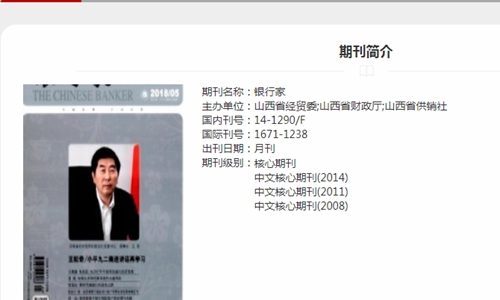HOME >> CHINA
Editor-in-chief publishes son’s essays, sparks criticism
By Wan Lin Source:Global Times Published: 2020/1/15 21:03:40

Introduction of The Chinese Banker on the journal's website Photo: web
A Chinese financial journal's editor-in-chief was found to have been publishing his son's essays as early as 2006 when the boy was 10 years old, which further escalated public discussions on academic misconduct.
Wang Songqi, a research fellow at the Chinese Academy of Social Sciences, was found to have published his own calligraphy and dozens of essays by his son in a special column "A collection of father and son" which he created on the journal The Chinese Banker. Wang had also recommended his son's book in the column in 2014.
The majority of the articles published on the journal were academic.
The news further escalated discussions on corruption in academic publishing, after an article fawning the author's mentor published on a core scientific journal seven years ago sparked public outcry.
The supervisor of the financial journal, Shanxi Academy of Social Sciences, said on Wednesday that the institute is dealing with the case, and has ordered the journal to rectify misconduct. It said Wang will be handled in line with regulations.
In 2007, Wang said his son's work was "pure and vivid with a gorgeous and timeless style, like a fresh wind."
One of his son's essays was about animals and vegetations of the four seasons.
"Who wants to read such diary-like things written by a primary school student on a core financial journal?" a Weibo user asked.
Wang once responded on the journal that he knew publishing his son's works might be considered an abuse of power, but would rather take the risks, which exactly shows the journal's stand - putting good articles in the first place.
As to claims the essays were irrelevant to finance, Wang said that the section on culture and entertainment is designed for all types of works, including poems and essays. The articles were reviewed and selected by a special group of editors; therefore, it is "not a problem" to publish his own work or his son's.
"How much power can an editor-in-chief have in terms of deciding what to publish on the journal?" a netizen asked with an angry emoji.
The role of editor-in-chief varies as some have the authority while others are just nominal, Hao Zhensheng, an experienced publishing academic, told the Global Times on Wednesday.
Newspaper headline: Editor's work raises academic fraud claims
Posted in: SOCIETY